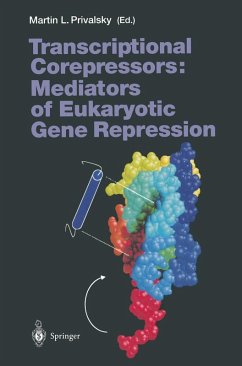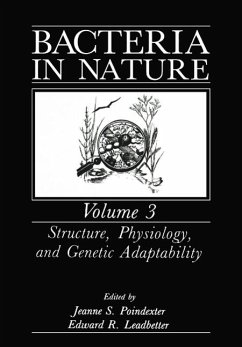
Initiation Signals in Viral Gene Expression (eBook, PDF)

PAYBACK Punkte
36 °P sammeln!
Elucidating Mechanisms of Eukaryotic Genetic Expression by Studying Animal Viruses AARON 1. SHATIGN* Eukaryotic genetic expression is carefully regulated. Normal cell growth and division, tis sue differentiation, and organism development all depend on a strictly ordered progres sion of specific events. Perturbation of the control of these processes, for example by ex posure to harmful chemicals or infection with viruses leads to aberrant forms of meta bolism, often resulting in malignancies and cell death. One of the most challenging problems in biology is to derme at the molecular level the m...
Elucidating Mechanisms of Eukaryotic Genetic Expression by Studying Animal Viruses AARON 1. SHATIGN* Eukaryotic genetic expression is carefully regulated. Normal cell growth and division, tis sue differentiation, and organism development all depend on a strictly ordered progres sion of specific events. Perturbation of the control of these processes, for example by ex posure to harmful chemicals or infection with viruses leads to aberrant forms of meta bolism, often resulting in malignancies and cell death. One of the most challenging problems in biology is to derme at the molecular level the mechanisms that govern gene function in higher organisms, including ultimately man. This goal serves to unify the diverse efforts of many investigators, whether studying the precise patterns of embryo genesis, the loss of control that occurs during neoplastic growth or the redirection of biosynthetic pathways in virus-infected cells. Recently there has been remarkable and exciting progress toward understanding the molecular biology of eukaryotic expression. Much of this rapidly increasing new infor mation has come from studies of animal virus systems. Just as investigations of the relatively simple, rapidly assayed, and easily manipulated bacteriophages lead to basic discoveries about prokaryotic cells, analyses of animal viruses and their interactions with host cells have provided fundamental information about how eukaryotic nucleic acids are organized for regulated replication, transcription, and translation. For example, the small genome of SV , like cellular DNA in chromatin, is associated with histones to 40 form nucleosomal arrays (Griffin 1975).
Dieser Download kann aus rechtlichen Gründen nur mit Rechnungsadresse in A, B, BG, CY, CZ, D, DK, EW, E, FIN, F, GR, HR, H, IRL, I, LT, L, LR, M, NL, PL, P, R, S, SLO, SK ausgeliefert werden.












